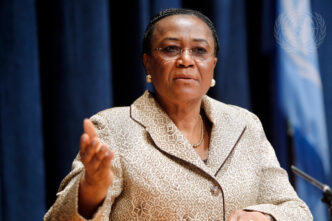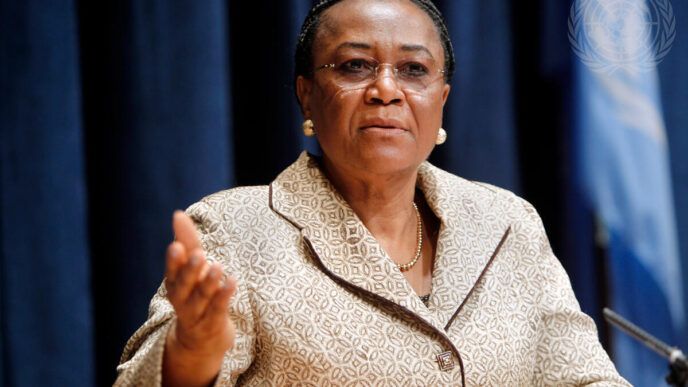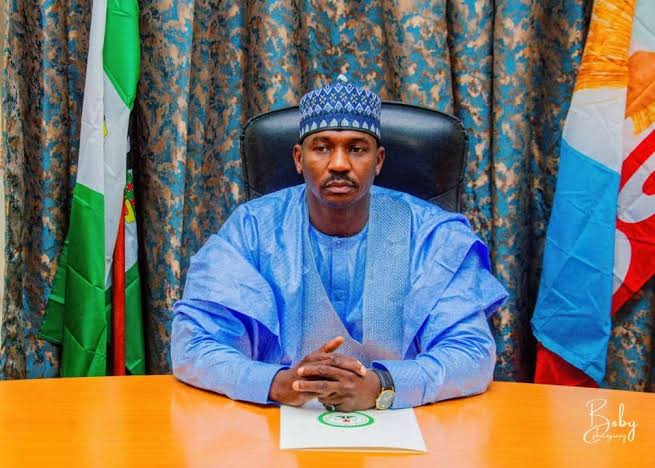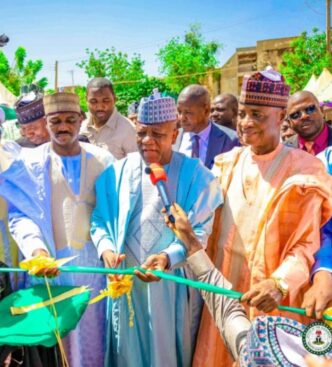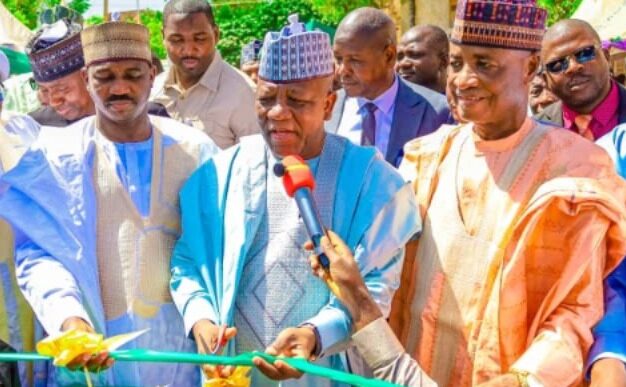The people of Sokoto State are no strangers to false promises and hollow campaigns of the Peoples Democratic Party (PDP). They have seen the decay of abandoned roads, housing estates, the silence over the water crisis, and the bitter reality for pensioners who waited fruitlessly for their entitlements to be paid. They are not gullible. What they demanded from former Governor Aminu Tambuwal was simple: functioning services, accountable government, and the provision of services.
But the PDP’s propaganda machine would want to make you believe otherwise. In desperate defiance of its own underwhelming record, the Sokoto chapter of the Peoples Democratic Party (PDP), along with its stooges, is orchestrating a crude campaign to discredit the APC’s achievements and rehabilitate the tarnished legacy of former Governor Aminu Waziri Tambuwal. They are consistently recycling stale narratives and deploying digital spin in the hopes of confusing the public. Yet the wounds from years of administrative negligence still fester, and the people refuse to be confused.
One of the gravest moral failures of the Tambuwal era is the unpaid pensions and gratuities owed to thousands of retirees of the Sokoto State public service. For years, these citizens, many of them low‑income workers who had given decades of loyal service, were left in limbo while state coffers were diverted towards Aminu Tambuwal’s presidential aspirations. That is not a policy misstep; it is an affront to the social contract. The failure to pay these benefits speaks to a deeper disorder: fiscal irresponsibility, budgetary malfeasance, and a governance philosophy that prioritized political ambition over human dignity.
If the PDP thinks it can sweep over this betrayal with a wave of online slander, it is sorely mistaken. Sokoto families know the difference between rhetoric and reality, and for many, the pain of unpaid pensions or lost incomes is raw and personal.
Tambuwal’s mismanagement was no accident of context; it was systemic. Under his watch, many flagship projects initiated by the Aliyu Wamakko administration were never completed. Funds meant for infrastructure, health, water supply, and education were disbursed, redirected, or left idle. What remained, until the coming of Governor Ahmed Aliyu’s administration, in many parts of the state were abandoned projects with flooded foundations and several unfulfilled promises.
Governor Ahmad Aliyu Sokoto’s administration, by contrast, has embarked on a mission to restore trust in government through visible projects. The Commission of Inquiry, led by Muazu Abdulkadir, has uncovered a compelling pattern: many contracts were inflated without deliverables, project scopes were repeatedly altered midstream, and public funds were dissipated through lack of oversight. Rather than slippery excuses, the people now see a responsive government delivering roads, housing estates, water supply projects, etc.
Let us examine some of the marquee projects left behind by Tambuwal, so we can truly appreciate the scale of the task inherited by the current APC government.
The Rijiya Flyover was launched with great publicity as a legacy project that would ease traffic and boost connectivity. Yet the structure was left abandoned, girders suspended, drainage incomplete, and the promises dead in the water. Soberingly, no follow‑through or corrective plan was evident until the current government stepped in. Governor Aliyu’s team re‑assessed the site, allocated funding, and reengaged contractors. Today, work is progressing steadily towards completion, and the flyover is no longer a monument to neglect but a testimony to governance.
The 40 Million Litres per Day Water Scheme, conceived by Aliyu Wamakko’s administration to quench the perennial thirst of Sokoto’s metropolis, was fragmented into six separate projects, with a total budget of N14.1 billion for ease of construction. Under Tambuwal’s presidency of the state, not one of these six projects was completed. Pipes were unused, reservoirs lay idle, and communities continued to queue for water or fetch water from rivers. Within two years, Governor Aliyu’s administration has completed and commissioned the Tamaje and Old Airport segments alone, delivering 24 million litres daily to residents.
Meanwhile, the remaining phases are advancing, with some already at roughly 70% completion. The contrast could not be starker: two years of consistent execution versus eight years of stalled blueprints.
The Sokoto Independent Power Project (IPP) was another ambitious project that floundered under Tambuwal. Funds were approved, receipts signed, but actual progress remained elusive. Under the current administration, N950 million was immediately injected to revive the project; the site is now approximately 90% complete, and final linkage to the TCN substation is in sight. Where Tambuwal left power hanging, Governor Aliyu is delivering connectivity.
Education, health, and rural development also bear the scars of neglect of the Aminu Tambuwal administration. Schools were roofless, hospitals lacked equipment and basic medicines, and there were delays in payment of salaries. Under Tambuwal, “projects” existed only on paper. The current administration has refurbished dozens of schools, delivered medical equipment to rural health centers and general hospitals, and reinstated health outreach programmes. In many cases, communities—like the one that suffered from flooding and several others that never benefited from projects—are beneficiaries of critical infrastructure like roads, solar-powered lights, and solar-powered boreholes for the first time in years.
And the pensioners? The leaky pipeline of unpaid entitlements persisted year after year under the old guard. Teachers, civil servants, retired health workers—all were left in financial limbo. Some died waiting for their pensions, which never came; others struggled in old age on the benevolence of their friends. This failure is not ancillary, as the PDP would prefer you believe—it is central. It underlines the governing philosophy of Aminu Tambuwal that placed his presidential ambitions and politics over people.
Governor Ahmed Aliyu’s administration did not treat these challenges as a footnote. Clearing the backlog of unpaid pensions and gratuities became one of the first priorities of his government. Structured payment plans, supplementary funding, and proactive engagement with retirees have signaled to Sokoto’s senior citizens: you will never be forgotten again.
What the PDP’s misinformation blitz has refused to address is the emotional and human cost of its negligence—families that went without food, children deprived of education because public services failed, citizens forced to pay for infrastructure that should have been free—especially with the education levy imposed by Aminu Tambuwal. No amount of rhetorical spin can restore a barren well, repair a collapsed road, or substitute for a pension check that never came.
Still, the PDP persists in recycling old campaign materials, sharing archival video clips, and invoking Tambuwal-era intentions as though they were accomplished. Their play is simple: confuse the memory, obscure accountability, and muddy the waters. But the people of Sokoto remember. They recall rural roads that were ignored and health posts that never functioned.
Their propaganda is not just insulting—it borders on contempt, as if the citizens have short memories or no capacity to judge. It is a tacit admission of weakness by a party that knows its record cannot stand scrutiny. The PDP is banking on noise, not substance; illusions, not delivery.
Contrast that with the performance of Governor Ahmed Aliyu’s government. In less than two years, over 250 visible and verifiable projects have been completed or are ongoing across every sector—education, health, water, roads, electrification, agriculture, and social welfare. No longer are public works announcements trapped in press releases. They are tangible in communities across Sokoto State. Schools have been refurbished and reopened, clinics supplied with essential medicines, boreholes drilled, diagnostic equipment delivered to hospitals, and roads constructed.
The APC-led government has also revamped procurement protocols, instituted transparent budgeting procedures, and begun to discipline lax contract enforcement. In short, the governance machinery is being retooled for accountability, not optics. The difference is not just in what is built, but in how it is built—with checks, monitoring, and responsiveness.
In the coming 2027 election, the PDP is attempting to rebrand itself on the same pallet of abandoned promises. But a party that hinges its appeal on an eight‑year disaster is offering nothing new. Its core message is: “Vote for us again, forget that we failed”.
Gatekeepers News is not liable for opinions expressed in this article, they’re strictly the writer’s.




